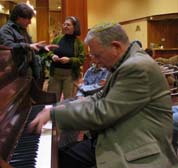That a worldwide revival of traditional Yiddish klezmer music happened at all is thanks in many ways to the numerous contributions of Pete Sokolow (b. 1940, Brooklyn, New York) .
Multi-instrumentalist, teacher, performer, record producer and orchestrator, his knowledge of traditional Jewish music came the old fashioned way: he learned it on the bandstands of some of the greatest klezmer musicians of the 20th century among others past NEA NHF winners Dave Tarras and Max Epstein. There, playing on thousands of weddings and bar mitzvahs, Sokolow accrued his wide ranging knowledge of Yiddish, Israeli and Chasidic music making him an invaluable and much sought after presence in each of those communities. That, coupled with his encyclopedic knowledge of music and a reputation as a demanding and very musical orchestra leader, meant that his bandstands were among the most coveted among New York’s Jewish music professionals.
In addition to being a community based bandleader, Sokolow enjoyed equal renown as a concert musician bringing his deeply rooted klezmer sound to concerts around the United States as well as numerous klezmer festivals in England, Germany and Poland.
Pete Sokolow’s enormous musical gifts are evident in his generous output of recordings, music books, and scores for award winning radio and film documentaries. He is a founding faculty member of the world’s most important Yiddish cultural event "KlezKamp: The Yiddish Folk Arts Program" where, for nearly a quarter century, his generosity as a teacher, mentor and model has made him a legend amongst a new generation of young and eager students who come from around the world to study with him.
Sokolow’s contributions to the world of Jewish music tell only part of his story as he is equally renowned as a player of early jazz and stride piano. Here too, he learned much of what he knows on the job playing with jazz icons like Doc Cheetham, Max Kaminsky and Johnny Mintz making him a long lived presence in the New York traditional jazz world.
Henry Sapoznik
Apr 23, 2008
Subscribe to:
Post Comments (Atom)


No comments:
Post a Comment